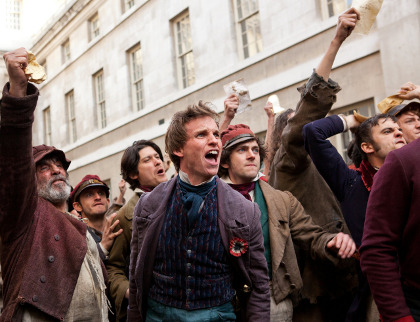
Movie Review: Les Misérables

Les Misérables
2012
This is a movie version of the famous Broadway musical championing the poor in early 19th century France. The plot centers on a prisoner, locked up for stealing some bread to save his sister’s son, who served 18 years for this “crime.” Jean Valjean is unable to make a life for himself after finally being released from prison, and is persecuted by the specter of parole for the rest of his life. He sometimes seems to be on the path to leading a selfless life, helping others, something he decides to do after divine intervention from the Church. But ultimately we find Valjean pursuing capitalist success due to his individualist beliefs, presumably learned from the Church that helped endow him with faith in life.
The French class struggle against monarchy and feudalism features prominently in the movie, featuring a young man who is inspired to fight for the people, but who is then distracted by his love for a girl he has seen only once. This girl is under the care of the former-prisoner, Valjean, who took her in as an act of charity. The revolutionary youth contemplates abandoning the revolutionary cause for love, but when the girl disappears he decides he has nothing to live for and so may as well fight for revolution. This is not a particularly inspiring message for revolutionaries: we should not be making decisions about devoting our lives to the people only as a last resort when our first choice of romance becomes unobtainable.
Valjean ends up in a position where he decides the fate of his former prison-master, now a policeman, the man who has been pursuing him ever since he broke parole. And he frees the man, in what we take as an act of religious good will. The policeman later catches up with the prisoner and lets him go free in return. This whole series of events, along with the early intervention of the Church in Valjean’s decisions create a major subplot in the movie devoted to an individualist debate over morals.
As for the French revolutionaries, they are a caricature of activists, with a fervently devoted leader, a key participant stuck in the debate over politics vs. love, and one young kid who nobly stands up for the people. This is a cruel minimization of the ideals of the class struggle, which was led by the then progressive emerging bourgeois class, but included the masses of workers and peasants in opposing the continued rule of the monarchy following the French Revolution. The young man in love with the former-prisoner’s daughter is saved, for love, while other revolutionaries are killed. The saved revolutionary easily leaves the struggle and his fallen comrades behind when given the woman of his dreams.
Ultimately the message of this movie is that loving an individual and having pure Church-supported morals, is the liberation of people. Inspirational visions of the struggle as a success at the end revive all the dead people, as if history can be changed with just a bit of love and individualism.








